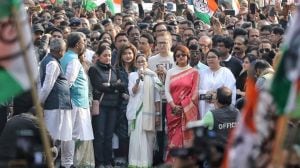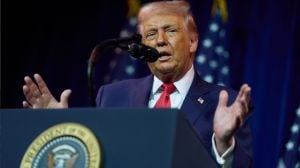The house that Jinnah built
For the longest time since 1947 and at least till 1980, the house that Mohammed Ali Jinnah built and lived in on Malabar Hill in Bombay, bef...

For the longest time since 1947 and at least till 1980, the house that Mohammed Ali Jinnah built and lived in on Malabar Hill in Bombay, before Partition made it out of bounds, was occupied by the British Consul-General. For the longest time, Islamabad requested New Delhi to at least lease it, if not sell it outright to them, as a gesture to the people of Pakistan and in the memory of the State he founded.
Twice, the Indian leadership agreed with the suggestion. First time around in 1978, when Atal Behari Vajpayee was Foreign Minister and visited Pakistan in February of that year, he is said to have conceded that the people of that country had a sort of claim on Jinnah8217;s house. The second time, in the early 8217;80s, P V Narasimha Rao as Indira Gandhi8217;s Foreign Minister, also made a statement in the Lok Sabha, saying that New Delhi had in principle agreed to lease Jinnah House as the residence of the local Consul-General of Pakistan. Meanwhile, the British occupants were asked to return the property. For many years, the building lay forgotten. In 1997, the Indian Council of Cultural Relations, an autonomous body managed by the MEA, acquired it. On the eve of the SAARC summit in January, MEA decided to turn it into a SAARC cultural centre.
That emotive issue has simmered and rankled beneath the surface, but never gone away. Pakistan would like to have it back in exchange for reopening India8217;s Karachi consulate. New Delhi insists the consulate be reopened first. The issue will come up when officials meet in June to discuss 8216;8216;friendly exchanges8217;8217;, one of the eight items in the composite dialogue process.
Sinha ka magic chalega kya?
External Affairs Minister Yashwant Sinha decided to take Hazaribagh, his constituency, at least partly into the 21st century by having the roads paved, streetlights installed and linked to the Railways. But after a poll rally a couple of days ago outside Ranchi, sub-divisional officer Vinay Sinkoo wasn8217;t quite impressed 8216;8216;they had permission to hold their meeting, but not block traffic8217;8217;. Turns out that Sinha, along with Ranchi MLA C P Singh, held the rally on the intersection of National Highway 23 and 5, causing a traffic jam all around for a couple of hours or so. And so the police, after allowing Sinha to complete his meeting, lodged an FIR against Sinha, Singh and other BJP members under Sections 143, 341 and 188 of the IPC.
It8217;s not clear whether Sinha will win Hazaribagh. He8217;s had a falling out with ex-BJP MP Mahavir Vishwakarma, who8217;s decided to stand as an Independent, as well as ex-MLA R K Sharma. Moreover, the Congress, RJD and JMM have decided to not split the vote but jointly support CPI candidate Bhuneshwar Mishra. Question now is, Sinha ka magic chalega kya?
Hindi-Chini bhai-bhai
India is likely to vote in favour of China and against a US-sponsored resolution criticising the human rights situation during the ongoing UN Human Rights Conference that is taking place in Geneva. While New Delhi8217;s decision to support Beijing is in line with its politically correct beliefs that the West has no business to interfere in another country8217;s internal affairs read, Kashmir, fact is that India8217;s support is crucial at a time when China is under the scanner especially for human rights violations in Tibet and Xinjiang 8216;8216;strike hard8217;8217; policies have wilfully executed people daring to rebel against the State.
New Delhi8217;s arguments that the US is sponsoring an anti-Chinese resolution because it8217;s an election year at home has merit. Fact also is that the US, backed by the UK and other Western nations, is sponsoring such a resolution after a gap of a few years. India8217;s support, meanwhile, underlines the political decision to mend fences with China. That is the underlying philosophy of the boundary talks between the two Special Representatives Brajesh Mishra and his counterpart, Dai Bingguo, of which two rounds have been concluded. Whatever the result of the elections, and whether or not he remains Principal Secretary to the PM, as the designated SR, sources said, Mishra will continue to lead India in the boundary negotiations with China.
The sound of silence
The MEA has never been known for its media friendly policies, but lately the ministry seems to have withdrawn even more into itself. It8217;s not known if this is because we8217;re in the middle of an election and that one man8217;s foreign policy fuel is another8217;s fodder. Or whether the self-protective seal is because the change of guard at the very top will take place soon, by July-end when Foreign Secretary Shashank retires. Background briefings seem to have dried up so completely that the MEA seems happy to put out US State Department 8216;8216;guidances8217;8217; instead. Such as on last week8217;s Indo-US official-level talks on the 8216;8216;quartet8217;8217; issues, that include missile defence, transfer of high-technology, civilian nuclear issues. The strange silence out of New Delhi probably indicates the strength of its strategic partnership with Washington.
- 01
- 02
- 03
- 04
- 05































